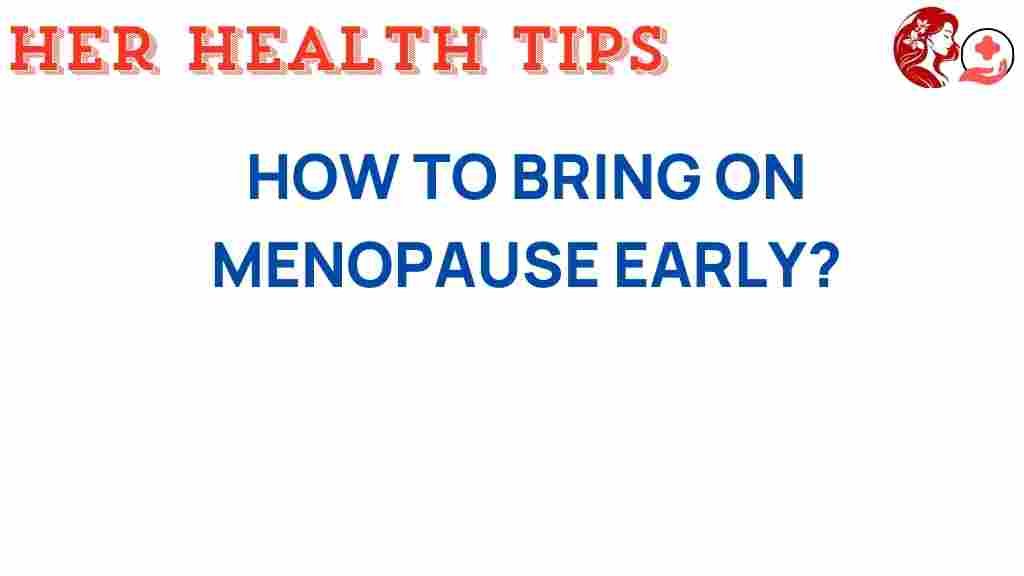The Surprising Path to Early Menopause: What You Need to Know
Menopause is a natural biological process that marks the end of a woman’s reproductive years, typically occurring between the ages of 45 and 55. However, some women experience early menopause, which can occur as early as their 30s or 40s. Understanding the factors that contribute to early onset menopause is crucial for women’s health and reproductive health. This article delves into the hormonal changes that lead to menopause, the lifestyle factors that can influence its timing, and the medical interventions available for managing early onset.
Understanding Menopause and Its Stages
Menopause is defined as the cessation of menstrual cycles for 12 consecutive months. It is preceded by perimenopause, a transitional phase where hormonal changes begin to occur, leading to irregular periods and various symptoms. The stages of menopause include:
- Perimenopause: The transition phase where women may experience hormonal fluctuations.
- Menopause: The point at which a woman has not had a period for 12 consecutive months.
- Postmenopause: The phase following menopause, where symptoms may continue but usually stabilize.
What Causes Early Onset Menopause?
Early onset menopause may be influenced by a variety of factors. Understanding these can help women manage their health proactively:
- Genetics: Family history of early menopause can increase the likelihood of experiencing it.
- Medical Conditions: Autoimmune disorders, thyroid issues, and other health problems can disrupt hormonal balance.
- Medical Treatments: Certain cancer treatments, such as chemotherapy or radiation, can induce early menopause.
- Surgical Interventions: Hysterectomy or removal of ovaries can lead to premature menopause.
- Lifestyle Factors: Smoking, excessive alcohol consumption, and poor diet can contribute to hormonal changes.
The Role of Hormonal Changes in Early Menopause
Hormonal changes play a significant role in the onset of menopause. Estrogen and progesterone levels fluctuate throughout a woman’s life, and their decline marks the transition into menopause. Key points regarding hormonal changes include:
- Reduced estrogen can lead to symptoms such as hot flashes, night sweats, and mood swings.
- Progesterone levels may drop, leading to irregular menstrual cycles and changes in menstrual flow.
- The body’s ability to produce hormones naturally decreases with age, but lifestyle and health factors can accelerate this process.
Lifestyle Factors and Their Impact on Menopause
Maintaining a healthy lifestyle can significantly influence the timing and experience of menopause. Here are some lifestyle factors to consider:
- Nutrition: A balanced diet rich in fruits, vegetables, whole grains, and lean proteins supports hormonal health.
- Exercise: Regular physical activity can help manage weight, reduce stress, and promote overall well-being.
- Stress Management: High-stress levels can exacerbate hormonal imbalances. Practices such as yoga, meditation, and deep breathing can be beneficial.
- Avoiding Smoking and Excess Alcohol: Both can negatively impact reproductive health and accelerate the onset of menopause.
Medical Interventions for Early Menopause
For women experiencing early menopause, several medical interventions can help manage symptoms and support health:
- Hormone Replacement Therapy (HRT): This treatment involves supplementing estrogen and progesterone to alleviate symptoms and protect against bone loss.
- Antidepressants: Certain antidepressants can help manage mood swings and hot flashes.
- Bone Health Medications: Medications like bisphosphonates can help strengthen bones in postmenopausal women.
- Regular Check-ups: Regular visits to a healthcare provider can help monitor health changes and manage symptoms effectively.
Step-by-Step Process for Managing Early Menopause
If you suspect you are experiencing early menopause, consider the following steps:
- Consult a Healthcare Provider: Schedule an appointment to discuss symptoms and undergo necessary evaluations.
- Keep a Symptom Diary: Track your menstrual cycle, symptoms, and any lifestyle changes to share with your doctor.
- Explore Lifestyle Changes: Implement dietary changes, exercise, and stress management techniques.
- Discuss Medical Options: Talk to your doctor about potential medical interventions, including HRT or medications.
- Monitor Your Health: Regular follow-ups to adjust treatment plans and address new symptoms.
Troubleshooting Common Concerns
Throughout the menopausal transition, women may encounter various concerns. Here are some common issues and how to address them:
- Hot Flashes: Dress in layers, stay cool, and consider discussing HRT with your doctor.
- Mood Swings: Engage in regular physical activity and mindfulness practices to improve mood.
- Sleep Disturbances: Establish a regular sleep routine, limit caffeine, and create a comfortable sleep environment.
- Weight Gain: Focus on a balanced diet and regular exercise to manage weight and maintain health.
Conclusion
Early menopause can be a challenging experience, but understanding its causes and effects is crucial for managing women’s health and reproductive health. By recognizing the role of hormonal changes, lifestyle factors, and available medical interventions, women can take proactive steps to navigate this transition. If you are experiencing symptoms or have concerns about early onset menopause, consult with a healthcare provider for personalized advice and care. For more information on reproductive health resources, check out this helpful resource.
Remember, early menopause is not just a medical issue but a life transition that can be managed effectively with the right support and information.
This article is in the category Reproductive and created by HerHealthTips Team
